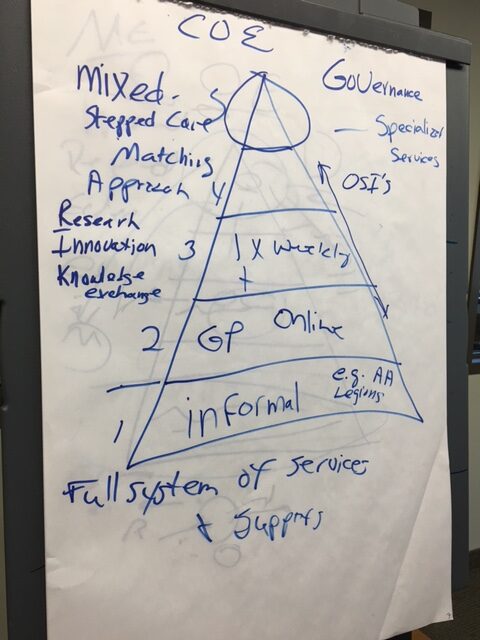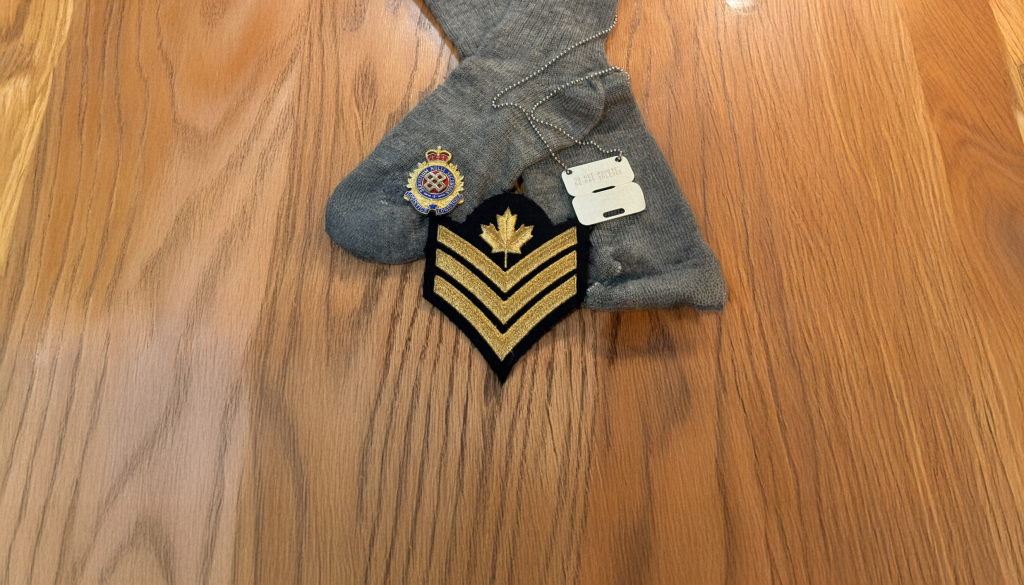- 2022-02-25
- Blog
Nothing About Us Without Us

It was only five years ago that discussions about a Centre of Excellence were initiated. Major-General (ret.) Glynne Hines, Warrant Officer (ret.) Brian McKenna, and Patrick were invited by the Minister of Veterans Affairs to join an advisory group. This group, composed of Veterans and mental health professionals, were tasked with providing guidance and insight to the Minister about mental health issues affecting Veterans and their Families.
These issues were, and still are, familiar to many Veterans and their Families – health care providers who don’t fully understand or recognize the unique impacts that military service can have on the individual and on the Family. Symptoms of PTSD treated with vastly different approaches in different parts of the country. Wait times of months or even years to access support, and the transition from active duty proving to be complex and without sufficient guidance.
As the advisory group started their work, one particular goal for the Minister jumped out. The creation of a Centre of Excellence (CoE) “with a specialization in mental health, post-traumatic stress and related issues for both Veterans and First Responders” had been set as a priority by the federal government.
The advisory group knew that this was an opportunity to change the story for Veterans and their Families – it was a chance to create a new reality where Veterans and Families are understood and receive the tailored supports they need. The question that needed to be answered was “What is the best way of ensuring that their service to the country is recognized and honoured through the provision of effective and relevant health care, consistently no matter where they live?”
The answer? By bringing together those who understand the journey most intimately, those with lived personal expertise, to work alongside professionals to co-construct a plan to improve health care knowledge and services for Veterans and their Families.
And so began the journey leading to the creation of the Centre of Excellence.
It was Brian who said, “I remember it’s after the election and Walt Natyncyk calls a meeting with a few of us who had advocated for this centre. He was honest, and said something to the effect that they were committed, but didn’t know actually what we meant. What would it do, where would it be?”
Move along a few months and it is now late 2016. A subset of Veterans and mental health professionals from the Minister’s advisory group is working hard to define what the Centre could be. Glynne recalls, “We agreed that we needed to focus on ‘what’ the Centre would do and not on ‘how’ it would be done or where it would be physically located. While there was a high degree of confidence that the CoE would be established with or without our advice (after all, the Prime Minister had more or less directed it), the devil was going to be in the details. And these details were going to have to come from the Veteran community AND the mental health specialists alike.”
“As I reflect back on the discussions, debates, and sometimes arguments, there was one point to which we returned time and time again – the importance of the Centre being Veteran- and Family-centric. If the future CoE wasn’t designed from the start with Veterans at the heart of it and involved with every major activity, then it would just be another well-intentioned but meaningless undertaking by scientists and bureaucrats.”
Glynne Hines
“It really was that simple. Veterans wanted to shape mental health treatments and supports for themselves and their Families. If that wasn’t in the final proposal, then we would have failed.”
Glynne Hines
The vision of Veterans and allied health care providers gained shape and momentum when, in 2017, funds were allocated in the federal budget for the creation of a Centre of Excellence on PTSD and Related Mental Health Conditions. The Centre was launched in April 2019 with a mandate to focus on the creation and sharing of knowledge on the prevention, assessment, and treatment of PTSD and related mental health conditions for Veterans and CAF members.
In the space of five years, the Centre has gone from scattered notes on a flip chart, to words in a mandate letter, and finally to a functioning and growing Veteran-centric hub of knowledge and information where Veteran and Family needs are the number one priority and nothing is decided without their input and involvement.
Today, the Centre of Excellence has established a pan-Canadian presence through its “Network of Networks” model, with Reference Groups made up of Veterans, Families, Service Providers, and Researchers. Each portfolio brings a different perspective, which is reflected in what the CoE does. Partnerships with other Veteran- and Family-centric organizations as well as academia round out the mandate.
Whether supporting communities of practice on Military Sexual Trauma or working with international voices in support of those impacted by the fall of Afghan government to the Taliban, in its short time on the Canadian landscape, the CoE is moving actively towards the vision established just a few short years ago. And, one of the reasons that vision remains true has been consistency of input and purpose with Hines, McKenna, and Smith all part of the development and implementation of the CoE.
Which brings us back to Patrick’s retirement. His goal was always to embed the Centre in a network of partnerships and collaborations and to ensure it was well staffed and functioning effectively. He says, “This was not a timeline specific purpose, but rather one of building the team, getting things firing on all cylinders, and stepping away to watch the organization take flight.”
Patrick’s immense energy for and commitment to creating an effective and meaningful Centre of Excellence is one of his greatest legacies. He has gathered a team of the highest calibre, guided in their daily work by four lived-experienced strategic advisors. The goal of ensuring Veteran and Veteran Family insight in the work of the Centre has truly been accomplished.
“For a lot of us, we had pushed for changes for many years, and continue to do so. The Centre is one of the changes that worked.”
Brian McKenna

